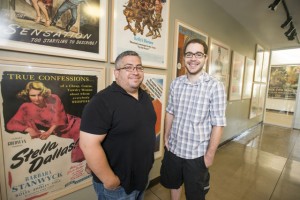Alumni’s Film Punches The Global Ticket


CSUN screenwriting alumni Joe Gonzalez, left, and Bradford Smith, right, stand inside the Mike Curb College of Arts, Media, and Communication. Photo by Lee Choo.
Bradford Smith and Joe Gonzalez met while sitting in hard, plastic desk chairs in a California State University, Northridge screenwriting class more than five years ago. Today, they work side by side in Gonzalez’s living room, where he sits in an “ugly brown chair” and plugs his laptop into his television, collaborating on screenplays that have earned the young duo invitations to global film festivals.
Gonzalez ’13 (Screenwriting) and Smith ’12 (Screenwriting) share a passion for and bachelor’s degrees in screenwriting, but their paths to Hollywood were remarkably different. It is precisely that diversity — a 10-year age gap and different upbringings and ethnic backgrounds — that make them marketable.
“Our partnership is different because of everything that makes us different as people,” Gonzalez said, during an interview on campus in September. “I’m 10 years older than him. I have a kid. I’m a minority. I don’t know if you can tell, but Bradford is not a minority.”
“I’m really white,” Smith said, chuckling.
“[Our diversity] gives us a unique voice,” Gonzalez added. “We can draw on our different experiences for inspiration.”
Their first film collaboration, Death to Cupid — which narrates a man hunting down Cupid, interrogating other mythical figures such as the Easter Bunny and Santa Claus to find his location — debuted at the TCL Chinese Theatre in Los Angeles in June and has been featured in 15 film festivals across the United States, including Comic-Con in San Diego. The film went global in October.
“We are going to be on the continent of Africa,” Gonzalez said, “at the Art City Film Festival in Cameroon. It’s something else.”
Smith said he was shocked to discover the film was getting so much traction.
“I never expected to go to Africa,” he said. “I was hoping for a couple of festivals, and [the film] is doing a lot better than that.”
Gonzalez said he never expected to get so much positive feedback from his film, reminiscing about its reveal at the Chinese Theatre earlier this year.
“You are sitting amongst 300 people, watching a movie that you created, and for the first time you are getting genuine reactions that aren’t from people who are biased about your work,” he said. “It’s a unique and pretty awesome experience.”
Both emphasized the importance of the connections they made at CSUN, which are still a part of their screenwriting work. One example they cited was the influence of professor emeritus Jim Jennewein.
“We both had him for comedy, and I had him for adaptation,” Gonzalez said of the professor’s screenwriting classes. “He came to see the premiere of Death to Cupid at the Chinese Theatre. We still keep in contact with him.”
Jennewein said he saw the duo’s potential the day they stepped into his comedy screenwriting class in 2013.
“I loved them in class,” he said. “They weren’t just smart about how to put a screenplay on a page — they also had the funny. It was quite evident that they needed to take their talent seriously from then on.”
The film industry is constantly transforming, so it’s important to be flexible beyond the writing styles film students typically learn in school, Smith said.
“There is only so much you can learn in a school environment,” Smith said. “The rest is all about trying new things and experimenting with your writing.”
For example, Gonzalez recounted the pair’s first meeting with an agent over a feature script. “She told me to stop writing features, and to focus on TV and comedy,” he said. “You have to be flexible, adapt. If you don’t do that [in this industry], then you’re dead.”
The industry is always changing, so it is vital that CSUN provides its students a realistic picture of the business, said Jon Stahl, chair of the Department of Cinema and Television Arts and a screenwriter.
“In all of our classrooms at various points, the instructors by necessity have to bring in professional reality to help students understand the business and how it is evolving,” Stahl said. “The business is constantly in flux. The landscape for a screenwriter setting out on a career path today is drastically different from when I began. That is why it is so valuable to have people who are in the trenches right now teaching in the classroom as well.”

 experience
experience